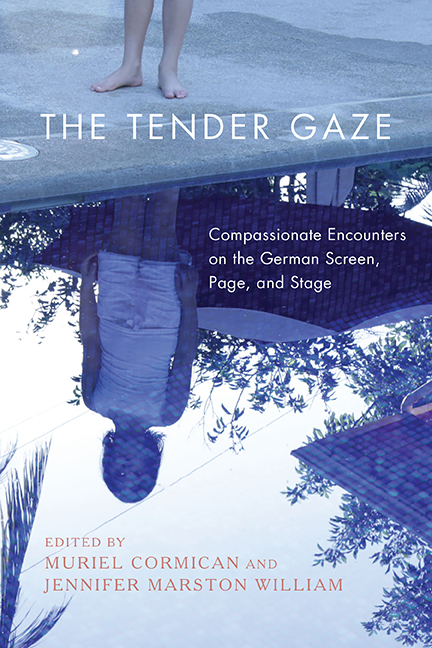Book contents
- Frontmatter
- Contents
- Acknowledgments
- Introduction: The Tender Gaze
- 1 Toward a Theory of the Tender Gaze: Affect, Critical Insight, and Empathy in Contemporary German Cinema
- 2 The Tender Gaze, Embodied Politics, and Perspective-Taking in German Postdramatic Theater
- 3 Face to Face: Race, Gender, and the Gaze in Mo Asumang’s Die Arier
- 4 “Risse, hinter denen man einen Kern entdeckt, der so ähnlich ist wie die Herzen von uns allen”: The Tender Gaze in Umut Dağ’s Risse im Beton
- 5 Looking through the Eyes of Empathy: Encouraging a Culture of Caring and Compassion in Doris Dörrie’s Keiner liebt mich
- 6 The Tender and Transgressive Beast Within: Escape Narratives in Films by Krebitz, Stuber, and Speckenbach
- 7 Looking at Looking in Margarethe von Trotta’s Das Versprechen
- 8 A Queer Phenomenology of Gender in Maren Ade’s Alle Anderen and Toni Erdmann
- 9 Rilke’s “Schauen”
- 10 Pity Stares or Tender Gaze? Seeing Disability in Nineteenth-Century Austrian and German Literature
- 11 The Sociohistorical and Gendered Implications of Gazing Tenderly in Ludwig Tieck’s “Liebeszauber”
- 12 Mothering, Animals, and the Surveillance State in the Anthropocene: An Ecofeminist Reading of Birgit Vanderbeke’s Die Frau mit dem Hund
- Notes on the Contributors
- Index
6 - The Tender and Transgressive Beast Within: Escape Narratives in Films by Krebitz, Stuber, and Speckenbach
Published online by Cambridge University Press: 05 October 2022
- Frontmatter
- Contents
- Acknowledgments
- Introduction: The Tender Gaze
- 1 Toward a Theory of the Tender Gaze: Affect, Critical Insight, and Empathy in Contemporary German Cinema
- 2 The Tender Gaze, Embodied Politics, and Perspective-Taking in German Postdramatic Theater
- 3 Face to Face: Race, Gender, and the Gaze in Mo Asumang’s Die Arier
- 4 “Risse, hinter denen man einen Kern entdeckt, der so ähnlich ist wie die Herzen von uns allen”: The Tender Gaze in Umut Dağ’s Risse im Beton
- 5 Looking through the Eyes of Empathy: Encouraging a Culture of Caring and Compassion in Doris Dörrie’s Keiner liebt mich
- 6 The Tender and Transgressive Beast Within: Escape Narratives in Films by Krebitz, Stuber, and Speckenbach
- 7 Looking at Looking in Margarethe von Trotta’s Das Versprechen
- 8 A Queer Phenomenology of Gender in Maren Ade’s Alle Anderen and Toni Erdmann
- 9 Rilke’s “Schauen”
- 10 Pity Stares or Tender Gaze? Seeing Disability in Nineteenth-Century Austrian and German Literature
- 11 The Sociohistorical and Gendered Implications of Gazing Tenderly in Ludwig Tieck’s “Liebeszauber”
- 12 Mothering, Animals, and the Surveillance State in the Anthropocene: An Ecofeminist Reading of Birgit Vanderbeke’s Die Frau mit dem Hund
- Notes on the Contributors
- Index
Summary
A RECURRING NARRATIVE APPEARS in a growing number of contemporary German films: lonely people, isolated in a technologically advanced urban environment that promises the good life but delivers no real emotional connections, desperately seek to escape social constraints and embark on a new course. Seeking both freedom and a sense of belonging, they radically break with their past and venture out in new directions with varying degrees of success. This narrative is accompanied by reflexive cinematography that highlights the protagonists’ vulnerability, sense of confinement, and desire for meaningful union with others. Three recent films demonstrate a compassion for their characters that allows viewers to question gender, ethnic, and class stereotypes and biases. Nicolette Krebitz's Wild (2016), Thomas Stuber's In den Gängen (In the Aisles, 2018), and Jan Speckenbach's Freiheit (Freedom, 2017) exhibit the tender gaze as defined by Muriel Cormican, a way of framing the characters that “does not condescend or reify … and invites the viewer to cast a compassionate rather than a cold eye on others.” The tender gaze in film “imbues the people and events depicted with a multidimensional complexity, decenters dominant cultural perspectives, and foregrounds anti-racist, anti-sexist, anti-classist, anti-homophobic, and anti-ableist heuristics in encounters with the other.” These realistic portrayals in the films examined here are marked by empathy toward flawed but generally decent individuals who display transgressive behavior including bestiality, recklessness, secret lives, self-preservation at all costs, and suicide. The combination of emotional content, narrative gaps, and reflexive camerawork helps viewers to feel empathy and understanding while also providing the distance needed to think critically. Jennifer Marston William has convincingly argued that emotional responses, and specifically empathy, are not divorced from cognitive thought, but rather they have the potential to elicit “prosocial effects of reduced prejudice and increased compassion that come from practicing perspective-taking at the movies.” The films under investigation employ techniques associated with Brechtian alienation effects while also affording opportunities for strong emotional reactions, and it is the balancing act between compassionate empathy and alienated distance that makes them so effective and contributes to the tender gaze.
In this essay I argue that the escape narratives reflect a concern with broadening acceptable notions of the relationship between self and community, freedom, and acceptance of difference.
- Type
- Chapter
- Information
- The Tender GazeCompassionate Encounters on the German Screen, Page, and Stage, pp. 107 - 124Publisher: Boydell & BrewerPrint publication year: 2021



